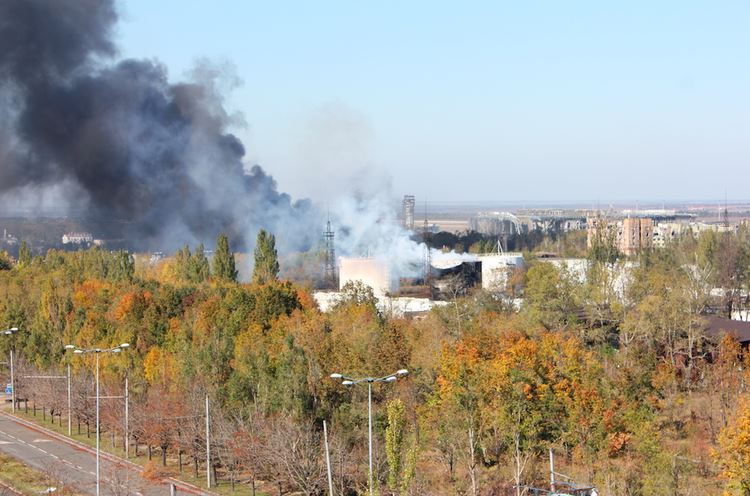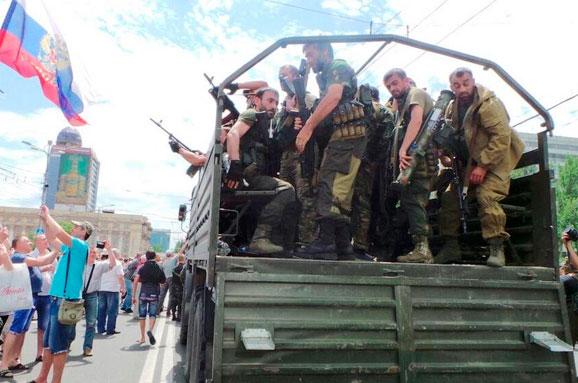My father, Viktor Makidon, was an officer in the Myrotvorets Battalion. He died of a heart attack in Sloviansk on July 22, 2014. He had retired before the war started in Eastern Ukraine, but decided returned to his duties as a policeman and volunteered for active duty in the front lines.
At first, I wanted to attend the Petro Sahaidachny National Academy of Ground Forces in Lviv, but then I changed my mind. I’m also a soldier of sorts as I studied at the Kyiv Military Academy. One day, my friend’s Mom took me to watch the graduation ceremony at the academy, and then I decided I’d like to study there. That was three years ago, and this year I entered the Academy of the Ministry of Internal Affairs.
Dad worked for the police force for 25 years. He’s from Nizhyn, and that’s where he worked first… and later in Kyiv. He retired in 2012. He enjoyed his work, although he often said it was difficult, but he did everything he could to make things better. He never tried to deal or scheme… we lived in a communal building, but we got an apartment after his death.
Dad took part in the Maidan. At that time, he was working as a security guard in a bank, which wasn’t too far from the central square. At first, he didn’t tell my mother, but somehow she picked up the smell of smoke and burning tyres on his clothes. He supported the protesters, but also felt deeply for the young policemen who were thrown randomly into this conflict. Dad tried to talk with them so that they wouldn’t beat or attack the activists. He really tried to somehow reconcile both sides.
When the Russians invaded Eastern Ukraine, Dad said he didn’t want to sit at home; he wanted to join his friends who’d already left for the front. One day, while Mom was at work, Dad started talking with me about what was happening. He asked me not to tell my mother, he’d tell her himself, he said, and set out to the police headquarters to sign up for the Myrotvorets Battalion. He was 44 years old. He told me it was his duty to protect us. I was scared… How could I be without a father?
A few days later, when he received his police officer’s certificate, he waved it in front of me and shouted happily: “Look, Mishanya, I’m a policeman again.” Then, he told my mom… there were tears, arguments and shouting, but Mom finally realized it would be better to support her husband than fight him.
The last time we saw Dad was after he’d completed his military training. His younger brother came to visit, and we sat, talked and laughed. Suddenly, his friends arrived, Dad told me and my mother not to worry, he’d be back soon, and asked me to take care of my mother.

I spent my holidays with Dad’s brother on the Desna River, but returned home earlier than expected. I can’t say I had some kind of premonition, but I really didn’t feel like staying there. Dad called as soon as I arrived, and we talked. He wasn’t feeling very well… his voice told me something was wrong. He was breathing hard and sometimes had to stop talking to catch his breath. He spoke with Mom for a long time, and she cried and cried…
My father wasn’t very open and didn’t like to show his feelings. I’m very much like him. But, during our last talk, he said that he wanted to be more open with me, that he loved me…He understood that such feelings are difficult to hide during war, you might not have time to express them to your loved ones. But he did!
This is what happened next, according to his friends… Dad hung up, stood there for a moment, bowed his head and fell to the floor. The doctors said he had a massive heart attack… although Dad had passed his medical with no apparent problems. He’s told Mom that he felt some pain in the chest and it was a bit difficult to breathe. She asked him to go and see a doctor and get treatment, but he smiled and replied: “How can I leave my guys and our positions here?”
They brought Dad had home in five days. I don’t remember this period very well, but I finally decided to go to the morgue with my mother and make sure it was really my father as I refused to believe it. When we looked at his body, we saw some wounds on the neck… maybe he was injured when they were leaving Popasna. He’d talked about the heavy shelling there. I questioned some of his friends again, and they replied: “Your Dad’s a hero! You should know that!”
I was very depressed during these months; I didn’t want to see anyone. I felt alone and broken inside. Finally, after six months, I started accepting Dad’s death and realized that I should start doing something because my father would probably look at me and say: “Come on, get going! Get up and stop feeling sorry for yourself!”
Before my father died, I viewed the world through a child’s rose-coloured glasses. Nothing bothered me, everything was great… but this tragedy changed everything. I realized I had to work and achieve everything on my own and stop expecting others to help me out. I got interested in politics and in what was happening around me. When I’m 21, I’ll buy some kind of weapon. It’s a dream because I believe that there should be a weapon in the house for protection.
Dad often called me Mishanya, and I called him Vitya. He was a cheerful and active man. On weekends, we often went out together… fishing, for example. He was a good friend who always supported and helped me. As a child, I liked war stories, I wanted to become a sniper, and my father told me a lot about different historical battles. I remember once we went to gather mushrooms in a nearby forest. He found a huge white mushroom and called me over. At that moment he saw a shell fragment from the Second World War lying nearby. Father told me to move away slowly, and then called for a group of demining engineers.
It’s only now that I fully understand why my father enlisted and went to fight. I’m very proud of him and the fact that he fought for his country and for us. After graduating from the academy, if the war is still ongoing, I plan to join the Myrotvorets Battalion. I’ve already told my mother. She thinks it’s just a passing fancy and I’ll get over it. But, it’s not… I want to go and experience what my father felt. And secondly, I want to have my revenge!
I hope that mothers, wives and children, friends and relatives will never feel such pain and loss. I don’t want to see tears anymore… it’s very difficult.

Despite his disability, my father, Albert Padyukov, joined the Aidar Battalion in summer of 2014. He was killed on August 19, 2014 near the village of Metalist, Luhansk Oblast.
Dad was a sculptor, a true artist. He was born in Western Ukraine, and moved from Mukachevo to Kyiv with his mother. About ten years ago, he was bitten by an encephalitis tick, so he had a lot of problems with his legs. Gradually, he began to walk, but not like before because he needed a cane. He was listed as disabled (Second Group).
Mom and Dad took part in the Maidan events; he was even knifed one night for his activist position… when he was returning home. He decided to enlist without letting anyone know. He told me about it over the phone, because at that time I was staying with some relatives in Mukachevo. The last time we saw him was when I was leaving for Mukachevo.
My father died on August 19 near Metalist. When I heard this news, I felt a deep sadness, but I was angry… so angry at the people who’d killed him, and then I fell into some kind of stupor. Dad was buried in the village of Klyachanovo in Transcarpathia; he was born there. My cousin, Vadym Tereshchuk, also fought in the war; he passed away in hospital a year ago, that is, he died of complications due to severe injuries.
My mother called father “Beto”, that was his call sign. His friends told us they didn’t want him to fight because of his disability, but he ignored them and was always first in line. He was a stubborn man, always wanting to move forward, never retreating. They also said he was a very honest and reliable person.
My father always spoke with authority and taught me to behave like a man. He practiced sambo and loved boxing. He enrolled me in a boxing club, and later in mixed martial arts. We talked a lot about my education, and eventually decided that I’d study medicine. I’m currently studying nursing at the Third Medical College in Kyiv. Later, I’d like to go into rehabilitation therapy… and I’d like to study psychology.
After my father’s death, I slowly realized that everything was up to me, and only me. I understood there’d be no more fatherly support and I’d have to help my mother. I have an older brother, but he doesn’t live in Kyiv.
I’m still very angry, but I understand that Dad wanted to do what he thought best. I don’t blame him. He understood the risks he was taking; it was his choice. But, his death has changed me… If he were alive, I know for sure that he’d guide me through life, but now I have to deal with it all by myself. Nobody can replace him, but I talk a lot with his brother, and to some extent he gives me what Dad could have given me.
I didn’t pay attention to many things before, but now I’ve started looking around more, studying the world around me, the people, their lives, and their problems. I dream of finishing my studies, getting a job I like and making good money. I also hope that everything will be all right for my family and friends, that this war will soon be over, that we’ll finally see an end to these deaths.
Dad dreamed of having his own studio…. in a big private home in Western Ukraine. But, everything’s turned out differently. I remember when we spoke for the last time, I told him to be careful, and he replied that everything would be fine, dearest son.









